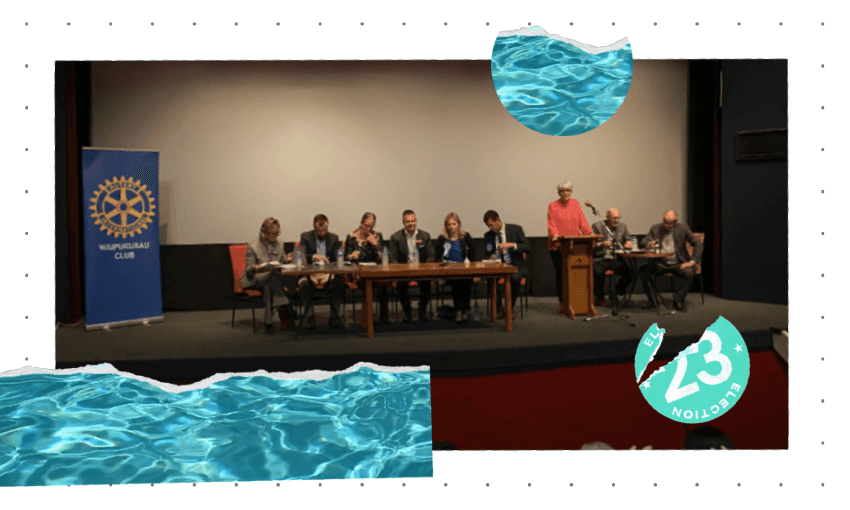At a public meeting in Waipukurau, Labour’s Kieran McAnulty said National’s unreleased economic plan won’t have any money set aside for the reforms once known as Three Waters. Stewart Sowman-Lund reports.
Labour’s Kieran McAnulty has “bet” that National’s forthcoming fiscal plan won’t have any money in it for water reforms and suggested the opposition’s numbers don’t add up.
The debate over the reforms formally known as Three Waters has subsided somewhat since the proposal was first put forward by the Labour government early in its term of office.
But at a candidates meeting in Waipukurau yesterday, where local infrastructure issues are high on the agenda for voters, it reared its head.
Asked to lay out their different visions around local infrastructure challenges, McAnulty, who is both the current MP and candidate for Wairarapa and also the local government minister responsible for the affordable water plan, defended the proposal. “There is $185 billion required to be spent on water services over the next 30 years and councils cannot do it by themselves. Councils are either at their debt cap already or if they’re not, their communities cannot afford higher rates,” he told the crowd.
“Central Hawke’s Bay is estimated to require up to $660 million over the next 30 years at a ratepayer base of roughly 10,000 that are connected to water services. You cannot afford it. You’ll be facing bills every year of over $9,000. This is the reality. If we don’t reform, you won’t be able to afford the bills.”
The policy, which replaced the controversial Three Waters plan, would see 10 regionally owned and operated water entities in charge of stormwater, wastewater and drinking water infrastructure (the “three” waters).
In the original plan, there were just four entities overseeing control of the water. The updated plan would see councils own the entities, which would be run by a group operated by a co-governance model between councils and mana whenua, along with a board appointed by that group.
National has promised to repeal the policy within its first 100 days in office if elected on October 14, which on current polling it will be.
McAnulty has called National’s plan the “status quo” and said he was willing to “bet” that the party’s pre-election fiscal plan “won’t [have] a cent allocated” to water. “There was one crucial piece missing in the alternative put forward… not one promise to pay for it,” McAnulty said of National’s plan, as outlined at last night’s meeting by the party’s Wairarapa candidate Mike Butterick.
“This is $185 billion. Even if they went 50/50 with councils, that’s $92.5 billion. They’ve promised they will write a cheque, that’s a promise they cannot keep. The only way to do that, remove the debt from council books, and actually pay for it in a way we can afford, is to reform.”
National has so far not released its full economic plan after this month’s pre-election fiscal update, or Prefu. The party’s finance spokesperson Nicola Willis has promised to unveil it ahead of early voting, which begins on Monday. Labour has not released its full plan either.
Speaking to The Spinoff after the candidates debate, McAnulty doubled down on his comments. “Part of the reason three waters – or affordable water – has calmed down is because they [National] have stopped talking about it. They’ve stopped talking about it because their numbers don’t add up,” said McAnulty.
“In some cases they’ll write some cheques, they’ve promised that to pretty much every council that is facing some massive bills. Even if they went 50/50 [with council] here in central Hawke’s Bay – that’s $325 million.”
But Butterick, a Masterton-based sheep and beef farmer and number 61 on his party’s list, said that National’s proposal made more sense – and it wasn’t the status quo either. “The thing is… the ratepayer and the taxpayer are actually the same person. It’s either going to come out of that pocket, or that pocket. There’s no money tree. Where’s the money coming from? The taxpayer or the ratepayer. It is not the status quo because we are prepared to put everything on the table for the councils, recognising that every council is unique,” he told The Spinoff.
“One size does not fit all. We are prepared to sit down and have all the options on the table and tailor-make a solution for each council. We have never said that the status quo is OK. There is no logic [to] how you can add layers of bureaucracy to make something cheaper, it just doesn’t make any sense.
“If different councils want to form partnerships, we’d support it but we wouldn’t require them to do it. The fundamental difference is that local people actually understand their issues… the real skill is to ask them for the solution, listen to them and then empower them to do it.”
The legislation necessary to implement the government’s planned reforms passed ahead of parliament wrapping up before the election, with both Labour and the Greens supporting it. However, most of the entities won’t be up and running until 2026, meaning National would have time to scrap the plan and overhaul it should it form the next government.





